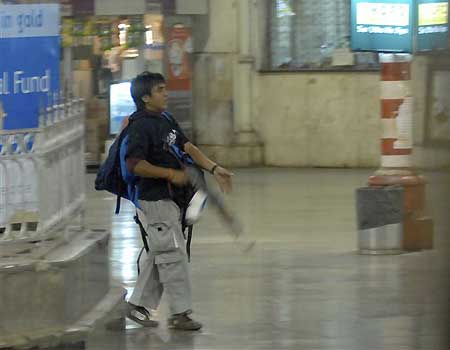Four years ago, almost to the day, the city
of Bombay was subject to invasion from the sea.
According to the official narrative, a
ten-man terrorist squad belonging to the Lashkar-e-Toiba set sail from Karachi
in Pakistan, hijacked an Indian trawler off the coast of the state of Gujarat,
and murdered its crew (save the captain, whom they murdered later after forcing
him to sail them to the seas off Bombay). They then transferred to a rubber
dinghy, helpfully leaving the trawler full of Pakistani food and grocery items
to aid in identification, and landed at a fisherman’s jetty.
That was the evening of 26 November 2008.
Spreading out through the town in twos and
threes, the ten man terror cell virtually held the city hostage for three days,
battling army and police commandos, killing precious Western tourists, taking
hostages and openly communicating by satellite phone with their controllers in
Pakistan. Finally, after prolonged fighting inside buildings while ranks of cameras
brought the images live to the world’s TV screens, nine of the fidayeen attackers lay dead. The tenth,
Ajmal Kasab, was captured alive.
I will not go here into a repetition of why
I consider the official account less than honest with the facts – I have
already written in detail on that point elsewhere[1]. This article
will deal with that tenth man...Ajmal Amir Kasab[2].
The virtually illiterate son of a curd
seller in Faridkot, Pakistan, Kasab was then 21 years old. A former petty
criminal, he was an unlikely candidate for any kind of recognition, let alone the
sort of attention he attracted worldwide, including books written on him and
his own Wikipedia article. But strange things happen to people.
Captured early on – on the very first
evening of the attack – Kasab played a relatively limited role in the events of
those days, but became a living, breathing symbol of the attack, a sort of
stand-in for the other nine, killed, terrorists. There was a famous photo of
him splashed across the world’s TV and newspapers, walking along a platform of
the Chhatrapati Shivaji Terminus, Bombay’s main rail station, with a backpack
slung over his shoulders and an AK series rifle in his hands.
Subsequent
photographs released after his wounding and capture showed him in a hospital
bed, being interrogated, and later on sitting in a chair during one of his many
later interrogations.
Before I go any further, let me state
something clearly and absolutely: Ajmal Amir Kasab was not an innocent man. He
was a murderer many times over, having been among the two-man fidayeen team which attacked the CST
railway station. He was caught on closed circuit TV at the station and
photographed close-up there with a gun in his hands, too. The fact that the
people killed at the CST were all middle- or lower-class commuters (and not
precious Western tourists or businesspeople, or Zionist rabbis or ultra-rich
Indians as most of those killed elsewhere during those days) does not reduce
his guilt one iota. He was guilty.
Now, as I said in an article[3]
written on the three-year-anniversary of the attack, I am occasionally proud of
some things this country does. Unlike a certain nation which mouths off on
freedom and human rights while drone-bombing weddings, and locks people in
cages for a decade or more without charge, let alone put on trial, India did
not dispose of Kasab quietly. He was not waterboarded, placed in stress
positions for days on end, deprived of his sleep or deemed too dangerous to be
given a day in court. On the contrary, he was tried, and his appeals heard, all
the way through the court system, quite openly and legally. While two Indian
Muslims accused of aiding and abetting the attacks were acquitted and released,
Kasab himself was sentenced to death, whereupon he appealed for clemency to the
President of India.
Again, before I go any further, let me say
something more: I am opposed to the death
penalty in every case. I don’t care what the individual circumstances are,
there are other punishments that can be inflicted, some of which are arguably
worse than a death sentence. Hell, I wouldn’t even want Barack Obama executed
for his war crimes, though I’ve joked about having him drone bombed, and that
tells you something. I have written in detail[4] about my reasons
for opposing the death penalty, and I’ll just quote a passage from that article:
1. It selectively targets the poor;
2. It puts a premium on the status of the victim as to
what punishment is given;
3. It leaves it entirely up to the (individual) judges to
decide which case attracts the death penalty and which doesn’t;
4. It’s carried out so many years later that all concept
of “justice” can be thrown in the dustbin;
5. It uses a cruel and unusual method, very prone to
going wrong;
6. It has no deterrent effect ...;
7. It ends up as a political football to be kicked around
by different parties; and
8. It leaves the victims' own crimes
unacknowledged, let alone unpunished.
Every death sentence has one or more of these features, and a lot of them
have them all.
And so -
Very recently – different websites I have
seen give different dates, from 5 November to 8 November to even 20 November – the
President, Pranab Mukherjee, rejected Kasab’s mercy petition. Two days ago,
Kasab was shifted from the Bombay prison where he was being held (and which has
no execution chamber) to a prison in Pune, where he was hanged this morning, 21
November, at 7.30am.[5]
The whole operation was conducted with the
greatest secrecy, and the execution was only announced after the event. Since
this kind of thing doesn’t happen on the spur of the moment, especially in a
notoriously lax nation like India, it’s obvious that the prison and police
officials concerned were aware that the mercy petition would be rejected, and when it would be rejected. Also, in a
nation where the last hanging happened way back in 2004, hangmen aren’t exactly
in plentiful supply; so one had to be found and alerted well in time, further
evidence that the rejection of the mercy petition was foreordained and its
timing very carefully orchestrated.
Now this is very interesting, you see, because there’s no law compelling the
President to dispose of a mercy petition within a particular time period. In
fact there are mercy petitions which successive presidents have been sitting on
for years on end because they are potatoes simply too politically hot to
handle, one way or other; such as the case of Afzal Guru, sentenced for aiding
a fidayeen attack on the Indian
parliament back in 2001. Even the Indian Supreme Court admitted the “evidence”
against Guru was less than overwhelming, but asserted that the “collective
conscience” of society demanded someone be punished for the crime. Presidents
have come and gone, but Guru’s mercy petition is still pending, and he’s as far
from the noose as he is from walking free.
But Guru is a Kashmiri Muslim, and the
government of India at the time of the attack on the Indian Parliament was run
by the Hindunazi Bharatiya Janata Party (BJP). The BJP demands that Guru be executed.
The current government is led by the Congress, which has an electoral alliance
with the Kashmiri political party, the National Conference. Also, except for
the Hindu right, most people are well aware that Guru is less than provably
guilty. Hanging him would therefore damage the Congress party’s relations with
the National Conference, and give the BJP a propaganda victory.
Similar is the case of three Sri Lankan
Tamils, members of the now defunct Liberation Tigers of Tamil Eelam (LTTE)
terror group, one of whose female suicide bombers blew away former Indian Prime
Minister Rajiv Gandhi in 1991. Their mercy petitions have been hanging fire
because they are Tamils, and the current government depends on support from
Tamil parties which are vehemently against these three men’s execution. Hence
they have not been executed.
Politics, as I said, is one of the
deciders. As surely it was the case here.
Pranab Mukherjee, the President of the
nation, is an old Congress functionary who owes his position as president
entirely to the party of which he was a member. Like most (but not all) recent
Presidents, he is a rubber stamp who obeys the orders of the party which put
him in power. Putting Kasab’s mercy petition on the fast track to rejection was
obviously a political move. Why was
it done at this time?
With the passage of every day, the Congress-led
government in Delhi finds itself more and more on the ropes. It’s in a minority
and dependent on the support of fractious and unpredictable outside allies who
can’t under any circumstances be taken for granted. Popular support has long
since been lost – the Congress has managed the monumental feat of proving
itself more corrupt than its BJP predecessors. And, when parliament convenes tomorrow,
it will face a combined assault from the right and the left over various issues
ranging from corruption to foreign direct investment in retail. Also, elections
in the Hindunazi-controlled state of Gujarat are due soon, and the BJP
government there would have made a poll point of the Congress “coddling” Muslim
terrorists.
So, a high-profile anti-terrorist act was necessary,
to scrape together what political capital was possible. And Kasab fit the bill.
After all, unlike Guru or the Tamils, he had absolutely no political support.
Nobody who can be called sane can have any doubt of his guilt. Hanging him wouldn’t
alienate the Muslims either, because Kasab and his partner, Ismail Khan, killed
many Muslims at CST. The very first person killed in the Bombay attack was also
a Muslim taxi driver whose cab was hired by Kasab and Khan from the point of
landing to CST; they put a time bomb in the cab before getting out. No, the
Muslims wouldn’t vote against the Congress for hanging Kasab.
In Indian politics, where people are
treated like voting blocs rather than individuals, such calculations matter. In
fact, in the Indian version of “democracy”, such calculations – called electoral
arithmetic – are all that matter.
At least Kasab’s hanging didn’t have the
long media circus preceding it that India’s last execution, in 2004, did[4].
I suppose we should be grateful for small mercies.
And now for a basic question which anyone
supporting the death penalty needs to answer:
Kasab and his band were sent over on a
virtual suicide mission, am I right? They had no hope of getting back, and were
going for Islamic martyrdom. According to India’s own official transcripts of
the conversations between the fidayeen
and their Pakistani handlers, they were ordered to die and become martyrs. So,
by hanging him, aren’t you basically giving him what he wanted in the first place? Wouldn’t keeping him in jail for
the rest of his life be a far more appropriate punishment?
Also, apparently, hanging Kasab brought “closure”
to the families of the dead in the attack.
Yes, I’m sure a lot of dead people will
come back to life tonight.
Or not.
Sources:
See also:



Good Message to Terrorists, even those who cross our boarders for terror related activities should be hanged !!
ReplyDeleteHow about those who cross our day scholars?
DeleteExcellent post, Bill. I love your blog; I learn so much from it.
ReplyDelete